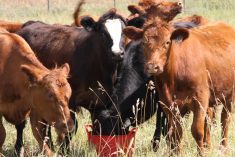SEOUL, South Korea (Reuters) – South Korean officials, battling their worst foot-and-mouth outbreak ever, said March 2 they had reopened most slaughterhouses to ease a nation-wide shortage of meat.
The slaughterhouses were closed earlier in an attempt to contain the animal disease.
South Korea is Asia’s fourth-largest economy.
Officials said in a separate statement that they had confirmed 150 cases of foot-and-mouth disease in 11 provinces during the past three months.
The county has already culled and buried a third of its hog population and five percent of cattle.
Read Also

Organic farmers urged to make better use of trade deals
Organic growers should be singing CUSMA’s praises, according to the Canadian Chamber of Commerce.
“Foot-and-mouth outbreaks have caused prices of pork and eggs to rally, also prices of alternative imported beef to rise,” a statement from the finance ministry said.
Average domestic prices of pork and imported beef have jumped a respective 35.1 percent and 17.3 percent over the past 12 months, the statement noted.
So far, 30 of the total 36 closed slaughterhouses have been reopened.
The nationwide outbreak of foot-and-mouth originated in pigs from the city of Andong in North Gyeongsang province.
The discovery triggered a massive animal slaughter, nationwide vaccination and record-high pork prices.
To ease a supply shortage, the government has allowed tariff-free pork imports of up to 110,000 tonnes during the first half of this year.
U.S. traders, meanwhile, said that South Korea might be requesting delays of up to 30 days on shipments of pork bought from the United States and other countries to allow better handling and distribution.
There was also talk of problems with letters of credit involving some of the pork imports.
Yet, traders in Seoul said major firms had concluded import deals for shipments through June and had no such shipment issues.
Small importers might have delays depending on financial conditions or possible bottlenecks due to rising demand, they added.
Daekuk, a beef and pork importer which distributes and processes locally, reported to the stock market in late February that it had failed to pay back parts of principal and interests for $5.52 million US of bonds with warrants, adding it would complete the payment by March 23.
Shares of Daekuk dropped more than 50 percent on March 2, less than two months after rallying to a 10-month high in January.














